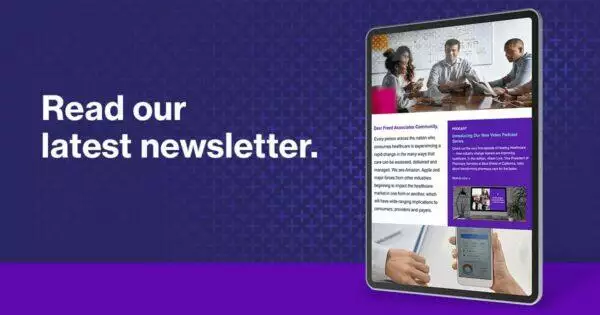New PMO Playbook Promotes Operational Alignment and Agility
While the PMO had available a project toolkit developed by past PMO leaders, it was inconsistently understood and used.

Problem to Solve
The project management office (PMO) of a large health care organization was struggling to consistently deliver successful project outcomes. This was due in part to increased demand for project support and recent turnover in PMO leadership and staff.
While the PMO had available a project toolkit developed by past PMO leaders, it was inconsistently understood and used. The toolkit had not been adapted to meet the changing type and size of the PMO’s initiatives and projects, and the toolkit lacked key tools and processes.
When starting a new project, PMO staff spent considerable time creating new project templates and clarifying roles and responsibilities. As a result, stakeholder experiences and engagement with the PMO varied significantly. Because certain key PMO processes were not fully defined, PMO execution also tended to be more reactive than proactive or strategic.
Looking to enhance PMO capabilities and create a more nimble, agile work culture, the organization engaged Freed Associates (Freed) to assess the PMO’s performance and help evolve the department’s processes and tools. Freed was tapped for this engagement based on its objectivity and extensive project management experience. The organization’s leaders hoped Freed could help lead the PMO to a higher degree of performance and execution.
Strategy and Tactics
Freed began by conducting a current-state assessment of the PMO, based on more than a dozen interviews with internal stakeholders, a thorough review of representative PMO documentation, and attendance at a half-dozen PMO operational meetings. At any given time, this PMO managed approximately 20 to 30 projects, with an aggregate overall value of $10-$20 million.
Freed’s assessment and analysis revealed several areas for improvement for the PMO, including:
- Intake and prioritization
- Capacity management
- Role clarity and project guiding principles
- Benefit realization
- Executive- and portfolio-level reporting
These issues were compounded by the fact that the PMO’s projects involved collaboration across multiple functions, with stakeholders working in multiple different locations. To support the organization’s distributed workforce and wide variety of stakeholders, the PMO needed a framework to more consistently and effectively guide its practices.
Based on the PMO’s needs and Freed’s knowledge of best practices in project and portfolio management, Freed subsequently developed two key deliverables: a PMO playbook and a playbook action/Kanban board. Accessible to PMO team members and stakeholders via SharePoint, the playbook would provide both an operating framework for the PMO plus a transparent resource for all stakeholders to know and understand the PMO’s operations.
The new PMO playbook was designed to standardize program and project management methodology, enhance collaboration and improve portfolio, project and program results. The Kanban board, an agile project management tool, was intended to help staff and leaders digitally visualize and track the implementation of the new PMO playbook and facilitate the subsequent continuous improvement of the playbook’s tools and processes.
The PMO’s new playbook covered all facets of the department’s strategic and tactical operations, ranging from project/program governance and roles and responsibilities to project intake and prioritization, reporting, and delivery. The playbook also provided guidelines for staff development and knowledge management to promote learning and exchange of information within the PMO team.
For ease of use, the playbook was divided into logical, searchable domain sections on SharePoint, enabling users to access detailed process information, tools, and templates stored in a dedicated document library. PMO staff and leaders could easily access and update all materials available, as well as control document versioning.
Results
Freed delivered a new digital playbook and playbook action/Kanban board, providing the PMO with the critical tools and technology it needs to effectively lead projects remotely. With these tools in-hand, the PMO is now better-positioned to engage stakeholders critical to achieving positive project results, adapt to increasing project volume, enjoy a more collaborative working environment, and rapidly onboard new PMO staff.
The flexibility and malleability of the playbook’s new tools and technology will be critical to its long-term usefulness for the PMO and its stakeholders. The playbook provides a foundational framework to define and communicate the full project portfolio lifecycle, from portfolio planning and decision-making through project implementation and portfolio reporting. The Kanban board supports the PMO as it adopts a continuous improvement approach, evolving and enhancing the playbook as project needs change and PMO capabilities mature.


